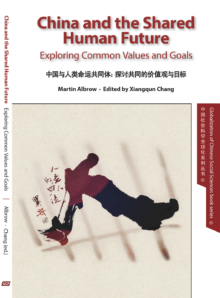The phrase ‘globalization of Chinese social sciences’ came out of a discussion with Professor Stephan Feuchtwang at the London School of Economics in 2010 about the title of a book commemorating the 100th anniversary of Professor Fei Xiaotong (Fei Hsiao-tung)’s birth. The dissemination of ‘Chinese social sciences’ covers a very wide range, in which the promotion of Fei Xiaotong’s work is only the first step. We therefore decided to use ‘Globalization of Chinese Social Sciences’ as the name of a book series in order to promote representative Chinese social scientific works. Here I shall briefly outline the key developments in ‘Chinese social sciences’ after 1949.
General Preface to the book series, Xiangqun Chang FRSA, Founding Fellow and President of Global China Academy, Honorary Professor of University College London (2015–20), Distinguished Professor of Nankai University
In the book I have aimed to emphasize the talent of the Chinese people in balancing commitment to values with setting goals that match the unique circumstances of any moment in time. It is an outlook, perhaps even a spirit, that I call ‘pragmatic universalism’. In China there is no reluctance to think in terms of one’s own spirit and the spirit of our time. Today, at this critical moment, when another line in world history is being drawn, I hope my book can add even the tiniest extra encouragement to China to realise its spirit as a truly global nation. It will then have achieved much more than the author could even have dreamed was possible in the years of its writing.
Preface, Martin Albrow FAcSS, Founding and Past Honorary President of Global China Academy
In recent years Martin Albrow’s writing has yielded two rather different companion books. They are China’s Role in a Shared Human Future: Towards Theory for Global Leadership (2018) and China and the Shared Human Future: Exploring Common Values and Goals, both published by Global Century Press.
Based on his 60-year academic career, the author selected essential work on the theory and practice of globalization. As the editor of this book, I collected the author’s almost complete work, including academic papers and writings, newspaper articles, lectures, speech notes in academic and public conferences, academic and media dialogues or interviews, and remarks for China’s special occasions during this period. They cover major themes like the Belt and Road Initiative (BRI), lifting the Chinese out of poverty and fighting COVID-19. This record will help readers to gain an understanding of how China participates in global governance and shaping global society. It can even be treated as an anthropological case study subject of a non-Chinese sociologist who has been participating in the field of ‘global governance and China’ through bidirectional engagements with Chinese academia, politics, publishers and media in the past 10 years. This book serves to demonstrate our collective efforts in exploring common values and goals for China and the shared human future.
Editor’s Preface, Xiangqun Chang FRSA, Founding Fellow and President of Global China Academy, Honorary Professor of University College London (2015–20), Distinguished Professor of Nankai University




